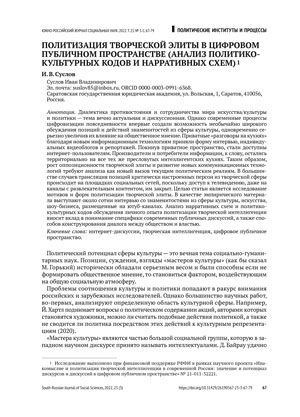Аннотация
Диалектика противостояния и сотрудничества мира искусства/культуры и политики — тема вечно актуальная и дискуссионная. Однако современные процессы цифровизации повседневности впервые создали возможность необычайно широкого обсуждения позиций и действий знаменитостей из сферы культуры, одновременно серьезно увеличив их влияние на общественное мнение. Приватные «разговоры на кухнях» благодаря новым информационным технологиям приняли форму интервью, индивидуальных видеоблогов и репортажей. Покинув приватное пространство, стали доступны интернет-пользователям. Производители и потребители информации, к слову, остались территориально на все тех же пресловутых интеллигентских кухнях. Таким образом, рост оппозиционности творческой элиты и развитие новых коммуникационных технологий требуют анализа как новый вызов текущим политическим реалиям. В большинстве случаев трансляция позиций критически настроенных персон из творческой сферы происходит на площадках социальных сетей, поскольку доступ к телевидению, даже на каналы с развлекательным контентом, им закрыт. Целью статьи является исследование мотивов и форм политизации творческой элиты. В качестве эмпирического материала выступают около сотни интервью со знаменитостями из сферы культуры, искусства, шоу-бизнеса, размещенные на ютуб-каналах. Анализ нарративных схем и политико-культурных кодов обсуждения личного опыта политизации творческой интеллигенции вносит вклад в понимание специфики современных публичных дискуссий, а также способов конструирования диалога между обществом и властью.
Ключевые слова
Информация о финансировании
Исследование выполнено при финансовой поддержке РФФИ в рамках научного проекта «Инакомыслие и политизация творческой интеллигенции в современной России: значение и потенциал дискурсов и дискуссий в цифровом публичном пространстве» № 21-011-32221.
Библиографические ссылки
Alexander, J. C. (2012). Performative Revolution in Egypt: An Essay in Cultural Power. L.: Bloomsbury Academic.
Anderson, P. (2011). Istoki postmoderna [The Origins of Postmodernity]. M.: Territoriya budushhego.
Bayrau, D. (1994). Intelligenciya i vlast’: sovetskiy opyt [Intelligentsia and Power: the Soviet Experience]. Otechestvennaya istoriya [Russian History], 2, 91–110.
Belousov, A. B., Davydov, D. A., Kochukhova, E. S. (2020). V postmaterialisticheskom trende: motivaciya uchastnikov protesta v skvere u Teatra dramy v Ekaterinburge [Post-Materialist Trend: Motivation for Protests in The Drama Theatre Square in Yekaterinburg]. Monitoring obshhestvennogo mneniya: ekonomicheskie i social`nye peremeny [Monitoring Public Opinion: Economic and Social Changes], 6, 53–72. DOI 10.14515/monitoring.2020.6.1694
Budabin, A., Richey, L. (2021). Celebrity, Disruption and Neoliberal Development. In Batman Saves the Congo: How Celebrities Disrupt the Politics of Development (pp. 1–28). Minneapolis; London: University of Minnesota Press.
Castells, M. (2012). Networks of Outrage and Hope: Social Movements in the Internet. Cambridge: Polity.
Colleoni, E., Rozza, A., Arvidsson, A. (2014). Echo Chamber or Public Sphere? Predicting Political Orientation and Measuring Political Homophily in Twitter Using Big Data. Journal of Communication, 2, 317–332.
Dahl, R. (1971). Polyarchy: Participation and Opposition. New Haven: Yale University Press.
Davydov, D. A. (2021). Ot “vlasti dostojnyh” k “vlasti populyarnyh”: blesk i nishcheta meritokratii v novuyu tekhnologicheskuyu epohu [From “Power of The Worthy” to “Power of The Popular”: Splendors and Miseries of Meritocracy in a New Technological Era]. Politiya: Analiz. Hronika. Prognoz [The Journal of Political Theory, Political Philosophy And Sociology of Politics Politeia], 4, 100–114. DOI 10.30570/2078-5089-2021-103-4-100-114
Fadeeva, L. A. (2017). Nacionalizm vs. Globalizm v intellektual’nom diskurse [Nationalism vs. Globalism in the Intellectual Discourse]. Vestnik Udmurtskogo universiteta. Sociologiya. Politologiya. Mezhdunarodnye otnosheniya [Bulletin of the Udmurt University. Sociology. Political Science. International Relations], 3, 302–308.
Fadeeva, L. A. (2007). Otvetstvennost’ intellektualov: kraeugol’nyj kamen’ ili kamen’ pretknoveniya intellektual’nogo soobshchestva? [The Responsibility of Intellectuals: The Cornerstone or the Stumbling Block of the Intellectual Community?]. Vestnik Permskogo universiteta. Seriya Politologiya [Bulletin of Perm University. Political Science Series], 2, 11–18.
Gadzhiev, H. A. (2020). Cifrovoe prostranstvo kak pole politicheskogo protivostoyaniya vlasti i oppozicii [Digital Space as a Field for Political Confrontation of Authorities and Opposition]. Politicheskaya nauka [Political Science], 3, 147–171. DOI 10.31249/poln/2020.03.07
Hartle, J. F. (2020). Art Contra Politics: Liberal Spectacle, Fascist Resurgence. In S. Gandesha (Ed.) Spectres of Fascism: Historical, Theoretical and International Perspectives (pp. 241–260). DOI 10.2307/j.ctvxrpzqv
Karlsen, R. (2015). Followers are Opinion Leaders: The Role of People in the Flow of Political Communication on and beyond Social Networking Sites. European Journal of Communication, 30(3), 301–318.
Kislicyn, S. A., Nektarevskaya, Yu. B. (2019). Politicheskie praktiki funktsionirovaniya elity, kontrelity i frondy v istorii Rossii [Political Practices of Elites, Counter-Elites, and Fronts in Russian History]. Nauka i obrazovanie: khozyaystvo i ekonomika; predprinimatel’stvo; pravo i upravlenie [Science and Education: Economy and Economics; Entrepreneurship; Law and Management], 6, 137–141.
Logunova, O.S. (2021). Digital-selebriti: transformaciya teoreticheskih podhodov [Digital Celebrities: Transformation of Theoretical Approaches]. Monitoring obshchestvennogo mneniya: ekonomicheskie i social’nye peremeny [Monitoring Public Opinion: Economic and Social Changes], 5, 12–31. DOI 10.14515/monitoring.2021.5.1992
Nozick, R. (1998). Why Do Intellectuals Oppose Capitalism? Cato Policy Report. Retrieved from http://www.kyoolee.net/Why_Do_Intellectuals_Oppose_Capitalism_-_Robert_Nozick.pdf
Olazabal, M., Neumann, M. B., Foudi, S., & Chiabai, A. (2018). Transparency and Reproducibility in Participatory Systems Modelling: The Case of Fuzzy Cognitive Mapping. Systems Research and Behavioral Science, 6, 791–810. DOI 10.1002/sres.2519
Ol`denburg, R. (2014). Tret’e mesto: kafe, kofeyni, knizhnye magaziny`, bary, salony krasoty i drugie mesta “tusovok” kak fundament soobshchestva [Third Place: Cafes, Coffee Shops, Bookstores, Bars, Beauty Salons, and Other “Hangout” Places as the Foundation of Community]. M.: Novoe literaturnoe obozrenie.
Rheingold, H. (1993). The Virtual Community: Homesteading on the Electronic Frontier. Cambridge: MIT Press.
Shirky, С. (2011). Cognitive Surplus: How Technology Makes Consumers into Collaborators. L.: Penguin Books.
Sunstein, C. R. (2004). Democracy and Filtering. Communications of the ACM, 12, 57–59.
Volodenkov, S. V. (2019). Vliyanie texnologiy internet-kommunikacii na sovremenny’e obshhestvenno-politicheskie processy’: scenarii, vy’zovy’ i aktory’ [Influence of Internet Communication Technologies on Contemporary Social and Political Processes: Scenarios, Challenges, and Actors]. Monitoring obshhestvennogo mneniya: e`konomicheskie i social’ny’e peremeny’ [Monitoring Public Opinion: Economic and Social Changes], 5, 341–364. DOI 10.14515/monitoring.2019.5.16
Wang, M., Wu, B., Kirschner, P. A., & Michael Spector, J. (2018). Using Cognitive Mapping to Foster Deeper Learning with Complex Problems in a Computer-based Environment. Computers in Human Behavior, 87, 450–458. DOI: 10.1016/j.chb.2018.01.024


